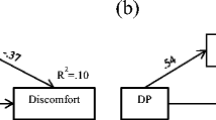Abstract
Cheating is fairly commonplace at both Tiers 1 and 2 AACSB accredited business schools. Distinct differences exist between Tiers 1 and 2 students with regard to cheating. Tier 1 students are more likely to cheat on written assignments, they believe sanctions impact cheating, and that a stigma is attached to cheating. Tier 2 students are more likely to cheat on exams, and nearly as likely to cheat on written assignments. Tier 2 students accept the notion that moral and ethical people cheat. Tier 2 students who are Business Administration majors, those who are employed 40 h or more per week, married students, and married students with children are more likely to cheat. At both Tiers 1 and 2 schools Asian students are less likely to cheat, but resident members of fraternities and sororities and those who drink frequently are more likely to cheat.
Similar content being viewed by others
References
AACSB Membership Directory, 2004.
American Council on Higher Education, 1990. (LA:HERI@UCLA).
D. Barrett J. Dalton (1981) ArticleTitleWhy College Students Cheat Journal of College Student Personnel 11 545–550
D. N. Bunn S. B. Caudill D. M. Gropper (1992) ArticleTitleCrime in the Classroom: An Economic Analysis of Undergraduate Student Cheating Behavior Journal of Economic Education 23 197–207
W. M. Gardner T. Roper C. C. Gonzalez (1988) ArticleTitleAnalysis of Cheating on Academic Assignments Psychological Record 38 543–555
P. W. Grimes (2004) ArticleTitleDishonesty in Academics and Business: A Cross-Cultural Evaluation of Student Attitudes Journal of Business Ethics 49 273–291 Occurrence Handle10.1023/B:BUSI.0000017969.29461.30
V. Haines G. Diekhoff E. LaBeff R. Clark (1986) ArticleTitleCollege Cheating: Immaturity, Lack of Commitment, and Neutralizing Attitude Research in Higher Education 25 342–354 Occurrence Handle10.1007/BF00992130
C. M. Hetherington S. E. Feldman (1964) ArticleTitleCollege Cheating as a Function of Subject and Situational Variables Journal of Educational Psychology 55 212–218
J. P. Houston (1983) ArticleTitleCollege Classroom Cheating, Threat, Sex, and Prior Performance College Student Journal 17 229–235
J. P. Houston (1986) ArticleTitleClassroom Answer Copying: Role of Acquaintanceship and Free Versus Assigned Seating Journal of Educational Psychology 78 230–232 Occurrence Handle10.1037/0022-0663.78.3.230
M. R. Hyman R. Skipper R. Tansey (1990) ArticleTitleEthical Codes Are Not Enough Business Horizons 33 16 Occurrence Handle10.1016/0007-6813(90)90004-U
J. Kerkvliet (1994) ArticleTitleCheating by Economics Students: A Comparison of Survey Results Journal of Economic Education 25 121–133
L. A. Kidwell (2001) ArticleTitleStudent Honor Codes as a Tool for Teaching Professional Ethics Journal of Business Ethics 29 45–50 Occurrence Handle10.1023/A:1006442925586
R. A. Lawson (2004) ArticleTitleIs Classroom Cheating Related to Business Students’ Propensity to Cheat in the Real World? Journal of Business Ethics 49 189–200 Occurrence Handle10.1023/B:BUSI.0000015784.34148.cb
C. I. Malinowski C. P. Smith (1985) ArticleTitleMoral Reasoning and Moral Conduct: An Investigation Prompted by Kohlberg’s Theory Journal of Personality and Social Psychology 49 1016–1027 Occurrence Handle10.1037/0022-3514.49.4.1016
D. McCabe L. Trevino (1995) ArticleTitleCheating Among Business Students: A Challenge for Business Leaders and Educators Journal of Management Education 19 205–218
F. G. Mixon (1996) ArticleTitleCrime in the Classroom: An Extension Journal of Economic Education 27 195–201
T. D. Nelson N. Schaeffer (1986) ArticleTitleCheating Among College Students Estimated with the Randomized-Response Technique College Student Journal 20 321–325
C. Nowell (1997) ArticleTitleUndergraduate Student Cheating in the Fields of Business Journal of Economic Education 28 3–13
G. Pavela D. McCabe (1993) ArticleTitleThe Surprising Return of Honor Codes Planning for Higher Education 21 27–32
A. C. Singhal (1982) ArticleTitleFactors in Students’ Dishonest Psychological Reports 51 775–780
K. Smith J. A. Davy D. Easterling (2004) ArticleTitleAn Examination of Cheating and Its Antecedents Among Marketing and Management Majors Journal of Business 50 63–81
M. L. Smyth J. R. Davis (2004) ArticleTitlePerceptions of Dishonesty Among Two-Year College Students: Academic Versus Business Situations Journal of Business Ethics 51 63–74 Occurrence Handle10.1023/B:BUSI.0000032347.79241.3c
G. Stevens F. Stevens (1987) ArticleTitleEthical Inclinations of Tomorrow’s Managers Revisited: How and Why Students Cheat Journal of Education for Business 63 24–29 Occurrence Handle10.1080/08832323.1987.10117269
C. R. Tittle H. R. Rowe (1973) ArticleTitleMoral Appeal, Sanction Threats and Deterrence: An Experimental Test Social Problems 20 488–498
T. West S. R. Pickard C. B. Shrader (2004) ArticleTitleCheating and Moral Judgment in the College Classroom: A Natural Experiment Journal of Business Ethics 54 173–184 Occurrence Handle10.1007/s10551-004-9463-x
Author information
Authors and Affiliations
Corresponding author
Rights and permissions
About this article
Cite this article
Premeaux, S.R. Undergraduate Student Perceptions Regarding Cheating: Tier 1 Versus Tier 2 AACSB Accredited Business Schools. J Bus Ethics 62, 407–418 (2005). https://doi.org/10.1007/s10551-005-2585-y
Issue Date:
DOI: https://doi.org/10.1007/s10551-005-2585-y




